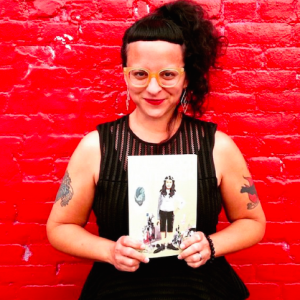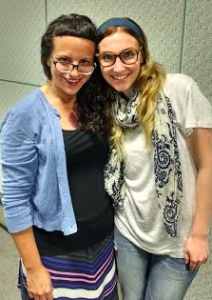Writers Read: Excavation by Wendy C. Ortiz
 LA-based writer Wendy C. Ortiz writes about her loss of innocence in her debut memoir Excavation, which has received rave reviews since its 2014 release. Ortiz’s writing is rife with figurative language like simile, metaphor, personification, parallel structure, alliteration, and repetition, but it is also incredibly self-reflective. Whether it’s the temporal distance that gives her this perspective (a forty-something Ortiz is far from her adolescent self) or her background in psychology (she holds an MA in clinical psychology), we the readers relish the connections she deftly makes and the brave insights she offers through the hindsight perspective and a strategic sampling of literary devices.
LA-based writer Wendy C. Ortiz writes about her loss of innocence in her debut memoir Excavation, which has received rave reviews since its 2014 release. Ortiz’s writing is rife with figurative language like simile, metaphor, personification, parallel structure, alliteration, and repetition, but it is also incredibly self-reflective. Whether it’s the temporal distance that gives her this perspective (a forty-something Ortiz is far from her adolescent self) or her background in psychology (she holds an MA in clinical psychology), we the readers relish the connections she deftly makes and the brave insights she offers through the hindsight perspective and a strategic sampling of literary devices.
It is by way of simile that Ortiz introduces us to the man who strips her of her naiveté. “Chalk dust scattered away from him [eighth grade English teacher Mr. Ivers] like an aura,” she writes (11). Pages later, his eyes meet hers, and a thirteen-year-old Wendy is biting her lip (15). All too soon, he’ll be “pressing his hardness against [her] and licking [her] thighs, then [her] clit” (23). All too soon, “the fevered rub of hips against the floor, the burn of carpet through clothes, the clenching of toes” will mean young Wendy’s undoing (29). But Ortiz is sure to convey said undoing beautifully. She compares the purple of concealed hickeys to flowers: “A small field of hickeys hid like violets under my t-shirt,” she says, thinking back on an afternoon romp with her former teacher. She has been marked, and it will take decades to excavate the hurt—to free “her body from the bitumen” (234).
Predators can sniff out girls like she once was—girls who come from broken homes where Mom is “despicable with drink,” Dad is an “occasional apparition,” and “I love you” is something you say “to the sidewalk.” As predators go, Mr. Ivers has a highly-attuned sense of smell.
Unfortunately for Ortiz, predators can sniff out girls like she once was—girls who come from broken homes where Mom is “despicable with drink,” Dad is an “occasional apparition,” and “I love you” is something you say “to the sidewalk” (30, 141, 63). As predators go, Mr. Ivers has a highly-attuned sense of smell. He notices Wendy when her own parents do not. He takes an interest in her writing and in her “dormant sexiness” (23). He steeps her in praise, then makes “unspoken promise[s] of sex” (23, 39). He hones in on the child with the “cream-colored Princess phone” and has her seeing cream as the stuff of sex, instead (44). Ivers sexualizes his student before she’s ready, whispering salacious suggestions in her ear and playing games of “tongue and touch” (73). (Notice Ortiz’s use of alliteration there too, with “cream-colored” and “tongue and touch”.) The narrator puts it succinctly: “I imagined I was a woman … actually, I was a girl” (177). It is lines like this that make the reader think: This lady gets it. She’s done the hard work of “brush[ing] this bone off” (235). She’s reflected. She understands her story.

Author Wendy C. Ortiz holding a copy of her second book Hollywood Notebook. Photo courtesy of FORTH Magazine.
The disparity between girl and woman is all the more pronounced as Ortiz inserts her young adult voice into the narrative as a counterpoint to the authorial voice of reason. The innocence of, “‘So like it doesn’t have to be specifically about school?’” contrasts sharply with the adult voice that explains, “It would be years before I could find the words that would fit my experience” (16, 41). Likewise, her “little girl’s headboard” and “little-girl dresser” and “cobwebby stuffed animals” sit in stark opposition to the “men in cars that stopped and offered [her] rides,” the “hit of acid,” the “inhalations of laughing gas … the next sexual encounter that … spoke of love” but reeked of wine coolers and marijuana and illicitness (93-95; 90; 162; 172; 135). The adult narrating lets us know she is at the helm with statements such as, “I felt thirteen, which was becoming more rare” (60); or “I saw my expression go from fourteen to ageless” (70); or “Suddenly, ‘fun’ sounded like something a fourteen-year-old would say” (87); or “I realized that was maybe the sixteen-year-old thing to say. I was often guilty of this” (178).
This guilt is something Ortiz wrestles with until her experience comes full circle—when she becomes a teacher to young students herself and later, a parent. “Could I ever imagine having some kind of sexual relationship with these kids?” she asks almost rhetorically when she is “twenty-nine, thirty, thirty-one.” The answer, of course: “absofuckinglutelynot” (28). Now, as a mother herself, she says, “I want nothing like what happened in my life to happen in hers … I want a magical existence for her” (233). And if you follow Ortiz on social media, you’ll see how beautifully she’s rising to the challenge (and also that her daughter is freaking adorable). As an adult in two authoritative roles, Ortiz is changing the narrative. She is reclaiming control. She is breaking the cycle. She is assuaging the misplaced guilt of her youth—the guilt that should be saved for Mr. Ivers and the “parents who were [in]capable of interpreting those [help me] signs” even though she “had undergone unthinkable acts right under their noses” (106, 233). With this book, the narrator bares herself, removing the “cloak of secrets and shame around [her] shoulders … [that she] would wear, always” and revealing instead a self-assured woman (read: perceptive, edgy, cool) and a proud member of both the queer and literary communities (212).
Ortiz, Wendy. Excavation. Portland: Future Tense Books, 2014.
 LA native Melissa (pictured here with Ortiz at the 2016 AWP conference) is a graduate of Antioch University Los Angeles’s MFA program, where she studied creative nonfiction writing. In her past lives, she freelanced for various entertainment magazines and local papers, taught middle school English, and custom-fit women for high-end bras at a specialty lingerie store in Toronto, Canada. Most recently, Melissa lived in beautiful Victoria, British Columbia, but now she‘s back in sunny Los Angeles, where she works in communications at a local private school, teaches mat and Reformer Pilates, reads a whole lot of nonfiction books, serves remotely as Copy Edit Manager for Lunch Ticket, and tries to sneak in the occasional Netflix viewing, usually while on speakerphone with her Canadian boyfriend as he drinks maple syrup straight from the source, and she nibbles daintily on dark chocolate (it’s an antioxidant, and besides, she deserves it after all that core work … or so she tells herself).
LA native Melissa (pictured here with Ortiz at the 2016 AWP conference) is a graduate of Antioch University Los Angeles’s MFA program, where she studied creative nonfiction writing. In her past lives, she freelanced for various entertainment magazines and local papers, taught middle school English, and custom-fit women for high-end bras at a specialty lingerie store in Toronto, Canada. Most recently, Melissa lived in beautiful Victoria, British Columbia, but now she‘s back in sunny Los Angeles, where she works in communications at a local private school, teaches mat and Reformer Pilates, reads a whole lot of nonfiction books, serves remotely as Copy Edit Manager for Lunch Ticket, and tries to sneak in the occasional Netflix viewing, usually while on speakerphone with her Canadian boyfriend as he drinks maple syrup straight from the source, and she nibbles daintily on dark chocolate (it’s an antioxidant, and besides, she deserves it after all that core work … or so she tells herself).





